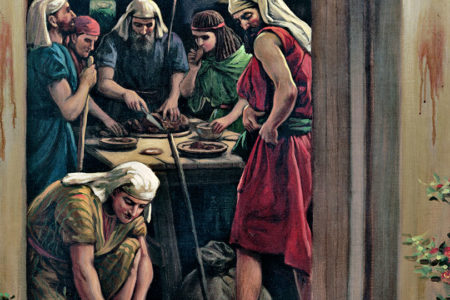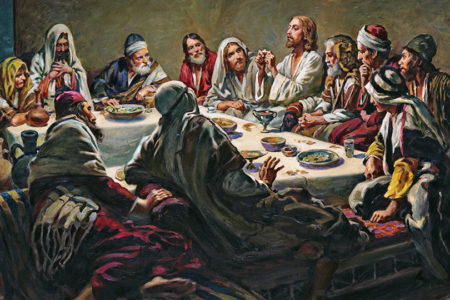The Seven Keys to History Part Six
Of all the events that have shaped history, there have been none more important than the crucifixion and resurrection of Jesus Christ. God’s ultimate solution to sin was brought to bear in the One who would become the Lamb of God.
While on Earth, Jesus told Israel, “Repent, for the kingdom…is at hand” (Mt. 4:17). Everyone at that time understood He meant the Davidic Kingdom. Israel, however, was unwilling to follow Him, leading to the sixth key to history: the church.
The Mystery Kingdom
A major shift took place in Jesus’ ministry in Matthew 12 when religious leaders accused Jesus of casting out demons “by Beelzebub [Satan], the ruler of the demons” (v. 24).
Jesus replied, “[A] house divided against itself will not stand. If Satan casts out Satan, he is divided against himself. How then will his kingdom stand?” (vv. 25–26).
He then told them they had deliberately blasphemed the Spirit of God by attributing to Satan a miracle He had performed in the Spirit’s power. (Such blasphemy probably cannot occur today because Jesus is not here physically.) “Whoever speaks against the Holy Spirit, it will not be forgiven him, either in this age or in the age to come,” Jesus said (v. 32). So on that day, those religious leaders severed themselves from God’s Kingdom forever.
From then on, Jesus spoke many things in parables (13:1–3). Yet He told His disciples, “It has been given to you to know the mysteries of the kingdom of heaven” (v. 11). So Jesus revealed a new phase in God’s program: the mystery kingdom—the church. He told the apostle Peter, “I also say to you that you are Peter, and on this rock I will build [future tense] My church, and the gates of Hades shall not prevail against it” (16:18). God had a plan all along that Jesus revealed.
The Church’s Composition
On the day of Pentecost (the Jewish holiday of Shavuot), God instituted the church. The Spirit of God fell in a special way on about 120 men gathered in an upper room. The event—the baptism of the Spirit (Acts 2)—took place 50 days after Jesus’ resurrection and 10 days after His ascension. The Spirit was present in the Old Testament, but His ministry changed in the new economy.
Many years later, the apostle Paul explained this special baptism: “For by one Spirit we were all baptized into one body—whether Jews or Greeks, whether slaves or free—and have all been made to drink into one Spirit” (1 Cor. 12:13). With the baptism of the Spirit, the church began.
When the Jewish leaders rejected Jesus, God revealed His longstanding plan: to reach out to Gentiles and make them fellow-heirs and members of the body of Christ, along with believing Jews. Paul explained this fact to the Ephesians:
When you read, you may understand my knowledge in the mystery of Christ, which in other ages was not made known to the sons of men, as it has now been revealed by the Spirit to His holy apostles and prophets: that the Gentiles should be fellow heirs, of the same body, and partakers of His promise in Christ through the gospel (Eph. 3:4–6).
The plan had been a “mystery, which from the beginning of the ages has been hidden in God who created all things through Jesus Christ; to the intent that now the manifold wisdom of God might be made known by the church to the principalities and powers in the heavenly places” (vv. 9–10).
Who are the “principalities and powers in the heavenly places”? They are the angels. The same purpose that existed for Adam and Eve and for the nation of Israel exists for the church: to manifest “the manifold wisdom of God” to the angels who stayed true to God when Satan rebelled.
The church, therefore, is comprised of all Spirit-baptized believers from Pentecost to the Rapture. There was no Spirit baptism in the Old Testament. Jesus told His disciples, “You shall be baptized [future tense] with the Holy Spirit” (Acts 1:5). This ministry is unique to the Church Age.
Also unique is the bond between Jewish Christians and Gentile Christians. Remember, God had given all the covenants to Israel. Unless Gentiles came to God through Israel, they were without hope and eternally lost. Paul told them,
You were without Christ [Messiah], being aliens from the commonwealth of Israel and strangers from the covenants of promise, having no hope and without God in the world. But now in Christ Jesus you who once were far off have been brought near by the blood of Christ. For He Himself is our peace, who has made both one, and has broken down the middle wall of separation,…that is, the law of commandments [the Ten Commandments and Old Testament Law],…so as to create in Himself one new man from the two, thus making peace (Eph. 2:12–15).
Today Jewish people who receive Jesus as Savior belong to the church, together with Gentiles who receive Him. No longer is there a separation because believers are one in Christ. Through Jesus, Gentiles who become Christians are grafted into God’s root program for Israel. However, Paul warned Gentile Christians not to think more highly of themselves than they ought:
For if you were cut out of the olive tree which is wild by nature, and were grafted contrary to nature into a cultivated olive tree [meaning Israel], how much more will these, who are natural branches [meaning the Jewish people], be grafted into their own olive tree?For I do not desire, brethren, that you should be ignorant of this mystery, lest you should be wise in your own opinion, that blindness in part has happened to Israel until the fullness of the Gentiles has come in (Rom. 11:24–25).
During this age, the essential difference between Jewish people who believe the Hebrew Scriptures and believing Gentiles is the identity of the Messiah. Consequently, everyone in the world falls into one of two categories: (1) Jews and Gentiles who reject Jesus as Messiah and Savior or (2) the body of Christ, made up of Jewish and Gentile believers in Jesus as Savior/Messiah. And though God’s ultimate program for Israel is in no way diminished or replaced by the church, in this divinely appointed interim, reconciling grace is extended freely to all through His commission to the church to proclaim the gospel the world over.
The Church’s Stewardship
The church’s foremost stewardship is the pursuit of maturity. Believers should glorify God by walking consistently under the control of the Holy Spirit, which produces spiritual maturity. Christians who do not walk under the Spirit’s control cannot glorify God even if they evangelize the lost.
Maturity can be both personal and corporate. God wants individuals to come to maturity, as well as corporate bodies of Spirit-baptized believers around the world. In fact, Paul said the objective of the spiritual gifts God gives believers is “for the equipping of the saints for the work of ministry,…till we all come to the unity of the faith and of the knowledge of the Son of God,…that we should no longer be children” (Eph. 4:12–14).
Maturity means reaching “the measure of the stature of the fullness of Christ” (v. 13) and involves consistently applying biblical wisdom to life’s circumstances. If we remain “children,” we are easily “tossed to and fro and carried about with every wind of doctrine, by the trickery of men, in the cunning craftiness of deceitful plotting,” and so forth (v. 14).
Many people today teach unbiblical doctrines. It takes maturity in Christ to decipher the truth. We are to walk in the Spirit, speak the truth in love, and show love in our relationships. The ultimate mark of maturity is to love one another. Jesus said, “By this all will know that you are My disciples, if you have love for one another” (Jn. 13:35). Knowing all the correct theology in the world means nothing without being able to manifest God’s love (1 Cor. 13:1–3). Paul reminded Timothy, “The goal of our instruction is love” (1 Tim 1:5 NASB).
Under the Law, the believer’s stewardship was to glorify God by obeying the Law. Under the church, the stewardship is to glorify God by walking under the Spirit’s control and growing to maturity. If you are a believer, God has given you all the help you need to walk in the Spirit and glorify Him, “which is Christ in you, the hope of glory” (Col. 1:24–27).
If you have placed your faith in Christ alone (not in good works), you have Christ in you and therefore are part of the church. You have been baptized into Jesus, and Jesus dwells in you. It is through the church—this conglomeration of believers around the world—that people hear how they can become right with God and have their sins forgiven. They learn that whoever believes in Christ “shall not perish but have everlasting life” (Jn. 3:16).
The Church’s Future
The Rapture. The next event on the church calendar is the Rapture. Paul said,
The Lord Himself will descend from heaven with a shout, with the voice of an archangel, and with the trumpet of God. And the dead in Christ will rise first. Then we who are alive and remain shall be caught up together with them in the clouds to meet the Lord in the air. And thus we shall always be with the Lord (1 Th. 4:16–17).
The church’s future is to be forever with the Savior. God’s church program on Earth ends with the Rapture. Our lives will continue in heaven, but Jesus will no longer be building His church.
The Judgment Seat of Christ. Second, all Church Age believers will then appear before the judgment seat of Christ to receive what God wants to give them for the degree of faithfulness they exhibited on Earth (2 Cor. 5:10).
The Marriage of the Lamb. The third event is the marriage of the Lamb (Rev. 19:7). As the bride of Christ, the church will have a special relationship with Jesus and be alongside Him as He reigns in His eternal Kingdom, first for 1,000 years on Earth, and then throughout eternity in the New Jerusalem.
The sixth key to understanding history is the church. Through it, God turned Israel’s rejection of Christ into a blessing for the Gentiles. For 2,000 years He has brought Gentiles from every nation, tribe, and tongue into His Kingdom. One day, as He has promised, He will bring the Jewish people back into the fold (Rom. 11:26–27). And their return will enrich the world (v. 12).
Until then, we must teach about Jesus, so people everywhere have an opportunity to repent and receive Him as Savior. For it is through Him alone that they can know true peace.
Adapted in part from the “Seven Cs of History” presented by Answers in Genesis.







